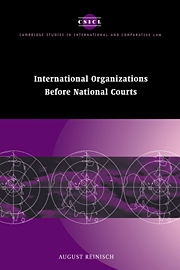Book contents
- Frontmatter
- Contents
- Preface
- Acknowledgements
- Table of cases
- Table of legal instruments
- List of abbreviations
- 1 Purpose, subject and methodology of this study
- PART I DESCRIPTIVE ANALYSIS
- PART II POLICY ISSUES
- PART III FUTURE DEVELOPMENTS
- Bibliography
- Index
- Cambridge Studies in International and Comparative Law
1 - Purpose, subject and methodology of this study
Published online by Cambridge University Press: 18 December 2009
- Frontmatter
- Contents
- Preface
- Acknowledgements
- Table of cases
- Table of legal instruments
- List of abbreviations
- 1 Purpose, subject and methodology of this study
- PART I DESCRIPTIVE ANALYSIS
- PART II POLICY ISSUES
- PART III FUTURE DEVELOPMENTS
- Bibliography
- Index
- Cambridge Studies in International and Comparative Law
Summary
Introduction
Studies of international organizations as parties to legal proceedings before national courts have been dealt with in the past mainly using traditional concepts, the two most important of which have focused on the domestic legal personality of international organizations and their immunity from suit. This study is broader in scope. It does not limit itself to issues of immunity or personality and thus does not view the issue from a preconceived legal point of view. Rather, it takes a primarily phenomenological approach: it describes how courts respond to international organizations in proceedings before them.
Although this study focuses on decided cases, it will also analyze scholarly writings and, in particular, the work of the International Law Commission (ILC), the Institut de droit international (IDI), the International Law Association (ILA) and other scholarly bodies entrusted with the codification and development of international law. However, in view of the abundant literature on issues concerning the legal personality of international organizations and their privileges and immunities, theoretical reflections will be kept to a minimum. An effort will be made to address the problems relevant to deciding actual cases. The emphasis is on the way decision-makers handle such problems in the real world of national courts. Therefore, this study will focus on national case law as well as on other legal documents potentially manifesting state practice. This study will not, however, confine itself to analyzing ‘how national judges behave’ in settling particular types of disputes involving international law.
- Type
- Chapter
- Information
- International Organizations before National Courts , pp. 1 - 32Publisher: Cambridge University PressPrint publication year: 2000



